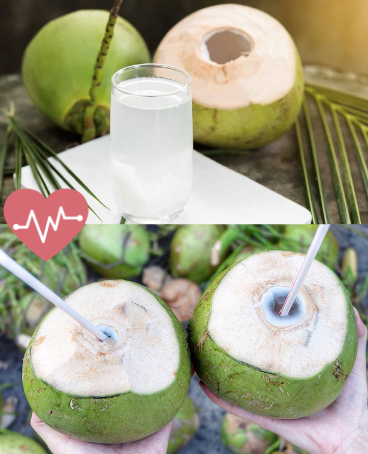
Is Coconut Water Really as Healthy as It Seems? Let’s Break It Down
Coconut water has taken the wellness world by storm. From yoga studios to supermarket shelves, this clear, slightly sweet liquid from young coconuts is everywhere. It’s marketed as nature’s sports drink, a hangover cure, a skin savior, and even a detox miracle. But before you go chugging it by the gallon, there are a few things you should know.
Whether you’re already a fan or just coconut-curious, here are 13 important facts that’ll help you sip smarter and stay informed.
Coconut Water Is a Natural Hydration Hero
Let’s start with the obvious: coconut water is packed with electrolytes. We’re talking potassium, magnesium, sodium, and even a bit of calcium. That’s why athletes and sweaty summer joggers love it. It rehydrates you better than plain water and way more naturally than artificially flavored sports drinks.
Been out in the sun too long? Feeling depleted post-workout? Coconut water might be just what your body’s craving.
It’s Low in Calories, So You Can Sip Guilt-Free
Watching your waistline? No problem. One cup of coconut water has only about 45 calories, making it a great alternative to sugary juices or sodas. You get the refreshment and the nutrients—without the sugar bomb.
It’s a tasty way to stay light without sacrificing flavor.
There’s More Than Just Water in There—It’s Nutrient-Rich
Beyond hydration, coconut water brings a few key vitamins and minerals to the table, like vitamin C, calcium, and—you guessed it—magnesium. These help support immune health, strong bones, and muscle function.
So yeah, it’s more than just a pretty drink with a tropical vibe.
It Naturally Detoxes Your Body
Thanks to its high potassium content, coconut water helps your body flush out excess sodium and toxins through urine. That makes it a gentle, natural detoxifier for your kidneys—and a friend to your liver, too.
Forget expensive juice cleanses. Sometimes, all you need is nature’s original cleanse in a cup.
It’s Great for Digestion, Too
Struggling with constipation or acid reflux? Coconut water’s got your back. Its fiber content and alkalizing properties help keep your digestive system in check.
It’s like a plumber for your gut—clearing things out and keeping them running smoothly.
May Help Lower Blood Pressure Naturally
If you’re watching your blood pressure, this might surprise you: potassium helps balance sodium levels, and coconut water is loaded with it. Some studies suggest regular consumption could help reduce hypertension—of course, always talk to your doctor first.
It’s not magic, but it might help your heart smile a little more.
Your Skin Loves It—Inside and Out
Want clearer, glowier skin? Coconut water is hydrating, and that’s great for your skin’s elasticity and tone. Plus, when used topically, it may reduce acne and inflammation due to its antibacterial properties.
So you can drink it or dab it—either way, your skin benefits.
Video : Coconut Water: Nature’s Health Drink with 8 Superpowers
Supports Heart Health in More Ways Than One
Aside from helping manage blood pressure, coconut water may also lower cholesterol and support overall heart function. The magnesium and potassium combo gives your cardiovascular system the tools it needs to thrive.
It’s like a gentle workout for your heart—with no gym involved.
But It’s Not for Everyone—Be Cautious
If you have kidney disease or already have high potassium levels (a condition called hyperkalemia), coconut water might not be safe. Always check with your doctor if you’re managing a chronic condition before adding it to your daily routine.
What’s healthy for one person can be risky for another—stay informed.
Yes, You Can Have Too Much of a Good Thing
It’s easy to love coconut water—but don’t overdo it. Drinking large quantities can lead to bloating or an electrolyte imbalance. The sweet spot? Aim for 1 to 2 cups per day, max.
Balance is everything, even with something as natural as coconut.
Don’t Fall for the Hype—It’s Not a Miracle Cure
Let’s be clear: coconut water is nutritious, but it’s not going to fix all your health problems. It’s not a magic potion. Don’t ditch your medications or think it’s a shortcut to weight loss. It’s best used as part of a balanced, healthy lifestyle.
Healthy habits always win the long game.
Always Choose Fresh Over Packaged
Not all coconut waters are created equal. Some packaged versions contain added sugars, preservatives, or even artificial flavoring. Whenever possible, go fresh—from a green coconut or an organic brand with minimal ingredients.
If you can’t pronounce it, you probably shouldn’t drink it.
Timing Is Everything: When to Drink It for Maximum Benefits
Wondering when to sip? The best times are:
- First thing in the morning – It jumpstarts hydration and boosts metabolism.
- Post-workout – It replenishes lost electrolytes and keeps you energized.
- After a night out – It’s a gentle hangover helper, thanks to its hydrating properties.
It’s like a tropical hug for your insides—any time of day.
Video : Coconut water craze: Is the drink really what it’s cracked up to be?
Conclusion: Sip Smart, Stay Balanced, and Soak Up the Benefits
Coconut water is more than just a trendy drink—it’s a hydrating, nutrient-rich option that fits into almost any lifestyle. From detoxing and digestion to glowing skin and heart health, it offers a ton of benefits—but like anything, it’s best in moderation.
So, go ahead. Crack open a coconut (or grab a trusted brand), enjoy the refreshing taste, and give your body a little extra love. Just be smart, stay informed, and listen to what your body needs.
Cheers to health, hydration, and a little taste of the tropics! 🥥💧✨


